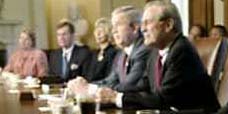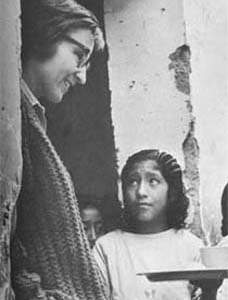
Turks on NBC's 'The West Wing': Head-Chopping Lunatics
Turks on NBC's 'The West Wing': Head-Chopping Lunatics
by Christian Christensen
Much to the surprise of many of my friends and family here in Istanbul, it would appear that we in Turkey are currently living under a fundamentalist Islamic regime hell-bent on instituting an absolutist version of Sharia Law. I have to admit, the news came as a bit of a shock, but since that is the way the country was portrayed in a recent episode (January 26, 2005) of NBC’s "The West Wing," it must be true. If there is one thing that we know about the people who write for television programs and films excreted from the Hollywood system, they are real sticklers for accuracy when it comes to the portrayal of non-Americans in general, and Muslims in particular.
A description of the controversial scene in the episode of "The West Wing" was outlined in the letter of complaint sent to NBC by the Assembly of Turkish American Associations (ATAA):
"The "West Wing" episode [...] takes place in the corn-growing state of Iowa and concerns a presidential campaign focused on farm subsidies, ethanol, and NAFTA. During the campaign, there arises an international crisis in which Turkey, having adopted Islamic laws under the leadership of the AKP, has convicted and ordered the execution by beheading of a woman, Karli, for having sex with her fiancée. The stated crime is adultery. The news, displaying a map of Turkey and the Turkish flag, adds that the execution will create difficulties for Turkey’s EU admission. Furthermore, the news states that despite the tragic situation of this Turkish woman, the US Administration places so much importance on Turkey’s alliance that it will continue to support Turkey."
The episode in question has yet to air in Turkey, but it has generated a firestorm of controversy in the Turkish national press. The Turkish ambassador to the United States and the ATAA wrote formal letters of complaint to NBC, and even the Turkish Prime Minister, Recep Tayyip Erdogan, brought it up during a meeting with US Secretary of State Condoleezza Rice during her recent visit to Ankara.
This brief yet grossly inaccurate portrayal of Turkey is typical of the way in which predominantly Muslim nations have been shown in the US media over the years, and only serves to reinforce ridiculous, ill-informed stereotypes. As the ATAA and other groups have pointed out, not only does Turkey not have legislation against adultery, Turkey -- unlike the United States -- does not have the death penalty. It is somewhat ironic that writers of "The West Wing" chose the death penalty to be a hindrance to Turkey’s joining the EU as a storyline, because, in real life, capital punishment was abolished as a direct result of Turkey’s efforts to join the EU. It is even more ironic that at the same time that images of Muslims as bloodthirsty, wild-eyed savages circulate endlessly in the US popular media, states such as Texas have no problem executing mentally-retarded prisoners or issuing defendants in death penalty cases with defense attorneys who are alcoholics or fall asleep during trials. The fact that Turkey is a staunchly secular nation is of little consequence to these scriptwriters: Turkey is 98% Muslim, and we all know what these people are like deep down, don’t we? So why let a little thing like accuracy get in the way of a juicy Islamic beheading story?
Naturally, the writers of "The West Wing" could have picked a country other than Turkey. Saudi Arabia, for example, has a far more brutal record when it comes to capital punishment. Perhaps NBC learned a lesson from what happened in 1980, when the British-American program "Death of a Princess" aired in the UK and in the US (on PBS). The program centered around the execution of a Saudi princess for adultery, and, after it was aired in the UK, the outraged Saudis recalled their ambassador from London and cancelled $400 million in arms contracts. In the US, PBS was placed under enormous pressure by both Mobil Oil (a major corporate sponsor of PBS) and the US Secretary of State to pull the program for fear of the Saudis turning off the oil tap (PBS aired the program anyway). Of course, far be it from me to suggest that a major international conglomerate like General Electric (owners of NBC) would be worried about things like this.
As a media researcher, it would be irresponsible of me to suggest that we are simply brainwashed into believing the skewed images of Muslims and Islam we see in media. Of course, people read newspapers. And, of course, there are people who are aware of the fact that Turkey is a staunchly secular democracy, and has been so since 1923. On the other hand, it would be equally irresponsible to deny the power of the media in shaping the way non-Muslims in countries such as the United States people look at people from countries such as Turkey. Force-fed a diet of terrible stereotypes over the years in the form of Hollywood films and network television, as well as poorly-reported and cliché-ridden news stories about the Muslim world, it is hardly surprising that people will assume that countries with a predominantly Muslim population will be full of anti-American religious fanatics who would love nothing better than to behead some promiscuous harlot.
While an argument could be made for a certain degree of "artistic license" for writers of programs such as "The West Wing," the fact remains that Muslim nations are regularly misrepresented in films, on television and in the press. One cannot treat scenes such as the one in "The West Wing" as idiosyncratic or isolated: they must be seen within a broader context. How much, one should ask, does the average American citizen actually know about Turkey? Would it be fair to assume that the information given about Turkey in "The West Wing" -- albeit a fictitious television drama -- could be taken at face value by a significant percentage of the millions of people watching the program?
For those of us who live in Turkey, the answers to these questions can be painfully obvious. As a Ph.D. student at the University of Texas at Austin, I heard stories of Turkish faculty members being asked by students where Turkey was located, and how they got home for the holidays. When the Turkish instructors said that they flew home, students were surprised to learn that there were actually flights to Turkey from the US. After moving to Istanbul, it was very common for people to ask me if it was easy to get a drink in the city, and if women had to wear a veil when going out (if you want to know the answers to those questions, go to the library). Finally, on a flight once from Stockholm to Istanbul on Turkish Airlines, I sat next to a middle-aged Swedish man who, upon seeing the flight attendant coming with food, joked to his wife, "I hope it isn’t camel!"
If NBC had written the story of that flight, it would have indeed been roast camel...served by a veiled flight attendant and with a copy of the Koran in the seat pocket in front of me. As it was, I got the beef and a bottle of red wine.
Christian Christensen is an Assistant Professor in the Faculty of Communication at Bahcesehir University in Istanbul, Turkey. He can be reached at bahcesehircc@yahoo.com










